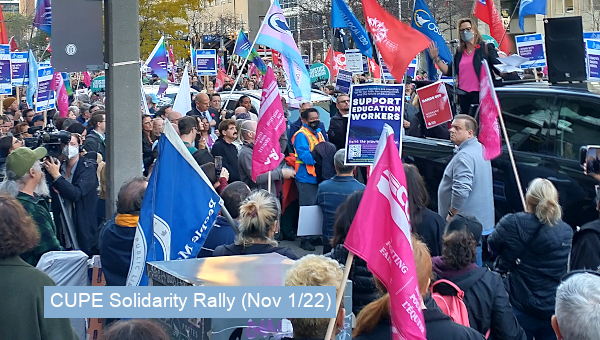The Toronto Municipal Strike: Who Do We Get Mad At?
Public sector strikes are frustrating to both the public and the strikers. The public is upset with losing daily services they have come to depend on, while the strikers are upset with the apparent lack of respect for the work they do. Though the attitudes of the public may not be decisive, they are increasingly a key factor in the outcome of strikes. A recent newspaper headline, referring to one of the leaders of the current strike of Toronto civic workers, captured the extent to which at present, public opinion – though angry at both sides – stands decidedly against the union: “Is Mark Ferguson the most hated man in Toronto?” (Toronto Star, July 20, 2009).
The issue in the strike is basically that the City is facing a financial squeeze while the workers have stubbornly refused to see this problem resolved at their expense. That financial deficit, it is clear enough, reflects two events that go beyond the current negotiations. First, for some time now provincial and federal governments have shifted programs and costs to the municipalities without a corresponding shift in revenue. Second, the current financial crisis has spread to the overall economy with major impacts on the budgets of all municipalities, including Toronto.
In both cases, no one can credibly blame the workers for the City’s financial squeeze. Why then the vitriol against the workers and their union?
Where is the Anger?
Where is the anger at the Provincial Liberals or Federal Tories for the cutbacks that were causing the deterioration in local services before the strike? Why is the Mayor of Toronto – our Mayor – not highlighting the pressures Queen’s Park and Ottawa have placed on the city’s budget and perhaps made the present strike virtually inevitable? Why, rather than taking this as a given, is the Mayor not leading a challenge against the policies of higher levels of government – all the more so when the deep recession we’re in increases local needs and when the official policy of all levels of government is to allegedly stimulate the economy. How does cutting back wages stimulate spending?
Where is the anger at the economic elite who so shamelessly rewarded themselves with scandalous salaries and pensions on the way to causing or at least being complicit in the current economic catastrophe? Why blame neighbours and other workers who have tried to set some decent community standards for pay and benefits, and – as we confront who will pay for ‘fixing’ the current mess – are we letting those most to blame yet most privileged off the hook?
It may very well be that reversing the downloading and the tax cuts to those who were truly irresponsible, is not enough. If we want a Toronto that maintains and improves its services while treating its workers decently, then more may be necessary and someone must pay for this. There is no justification in doing so on the backs of a particular group of workers that provide (as the strike shows) crucial services to our communities. If it’s a collective problem, then we should all share in its resolution. Wouldn’t the fairest response be to raise taxes on all Torontonians (which includes city workers) and doing so based on ability to pay (to also offset the dramatic growth of inequality within the city)?
Even so, there is one final set of questions that needs to be asked. Is the City’s response to its workforce, which came into this set of negotiations defensively in terms of their overall demands, really about the City’s deficit or is something longer-term at stake? Has the City, encouraged by other politicians and an aggressive business class, decided that this is the moment to exploit the crisis and make longer-term labour-management changes in its favour? Does the strike therefore reflect not a breakdown in negotiations but a conscious strategy on the part of the City Administration?
Who should we really be mad at? •
Labour Disputes in Ontario – Some Context
Steven Burdick
The current and unusually long strikes in Toronto and Windsor have excited much comment, although the absence of sustained comment from provincial and federal politicians is noteworthy. Although some have suggested the importance of viewing these disputes from labour’s point of view, most have expressed the view that the unions are failing to respond responsibly to new economic realities and the current and foreseeable difficulties facing the funding of municipalities.
Certainly it is apparent that strikes present grave difficulties. Workers and their families suffer an immediate loss of income which they may be ill able to afford; they also suffer enormously from the criticisms of a public inconvenienced by work stoppages. They suffer often enough, as well, with regret at the withdrawal of their services from those who need and rely on them. Strikes can also create problems for politicians who are responsible for ensuring the provision of the services the workers actually render. One must ask, however, why these strikes arise, especially when workers and their unions are seeking chiefly to maintain conditions of employment previously negotiated in good faith. In fact, Ontario’s unions are currently facing employers that want to rewrite longstanding provisions, and that want to reduce wages, benefits and working conditions for their workers.
One must ask why employers and its cities as employers are demanding such severe concessions, especially when economic recovery requires good jobs.
Fundamentally, Ontario’s cities, as those throughout Canada, lack the proper structural supports to deal with the needs of an overwhelmingly urban reality. These structural problems are essentially based in the absence of a recognition in Canada’s constitution of the role and importance of cities in our national fabric. Cities are, as often noted, constitutionally creatures of the provinces, although this fails to recognize that Canada is now primarily an urban entity, unlike the agrarian nation it was in 1867.
In their turn our provinces have failed to face adequately this problem as well. In Ontario these structural issues were greatly exacerbated by a massive downloading of responsibilities from the province to our cities during the Tory governments prior to the recent Liberal governments. Although the Liberal government has somewhat mitigated the damage created by the Tory governments, the municipalities are still effectively under-recognized and under-financed. No wonder, then, if our cities are struggling, regardless of the quality of their administration.
In the meantime the widely advertised financial crisis experienced worldwide recently, and massive technological changes in the production and delivery of goods and services have made our cities, in their role as employers, able to emphasize all the more their perceived need to cut costs and services. All of this emboldens those who see unions as, at best, agents of the past – possibly necessary in the past, but now irrelevant and detrimental to our modern society.
All of this presents employers and our cities as employers with a perceived opportunity to dismantle collective agreements that have served them as well as their employees. These agreements have also served the broader society.
It is a fact that unions, their members and ideas, have provided the services society expects and demands in raising living standards, in providing employment, and ensuring that in a modern world better ways of distributing the benefits of our economy and society exist than unbridled capitalism provides. Their collective agreements have served to raise the working conditions of other employees, by raising the base of expectations for all workers.
Where then does this leave municipal employees faced with concession bargaining? It drives them to strive to maintain benefits they possess in order to protect the interests of society as a whole. Even as enhanced wages and benefits have raised by example and social pressure the standards for all workers, reductions will affect not only them but society as a whole.
The social and economic importance of properly compensated and meaningful work is inescapable. Unions and their members understand this; economists understand this. Would that more of our employers and governments recognized and applied this in helping all of us in these difficult times. •





